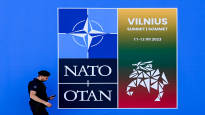In NATO, large-scale defense plans were considered unnecessary for several decades. However, the war of Russian aggression caused the alliance to return to its roots.
On Monday, NATO member countries reached an agreement on new defense plans in case of a possible Russian attack.
In the past, Turkey had blocked the progress of the process, mainly due to issues related to Cyprus. Turkey has occupied the northern part of the island since 1974.
So far, it is not clear what caused Turkey’s position to change. President of Turkey Recep Tayyip Erdoğan however, consulted the Swedish Prime Minister on the eve of the summit by Ulf Kristersson and the Secretary General of NATO Jens Stoltenberg with in Vilnius.
In NATO, large-scale defense plans were considered unnecessary for several decades. After the fall of the Soviet Union, Russia was no longer seen as a serious threat to international security.
However, the war of aggression started by Russia in Ukraine quickly made the defense union change its opinion. The ongoing war in Ukraine is the most serious military conflict in Europe since 1945.
– For 15 years, NATO thought that hybrid warfare and cyber security would pose the greatest threat to the alliance. Now the big wheel has started turning again and preparations have also been made for large-scale and traditional military conflicts, the former chief of staff of the Ministry of Defense evp. lieutenant general Arto Räty tells.
– In a way, this is a return to NATO’s roots in military planning, he continues.
In the years 1994–1997, Räty served as Finland’s first NATO-accredited liaison officer in Brussels.
NATO offers a new kind of backbone for the development of the armed forces
The new regional defense plans mean that NATO will start guiding its member countries in the development of forces and logistics so that they meet the requirements set by the new plans.
Räty does not believe that the plans of the Defense Forces to defend Finland will change significantly. However, the possibility of receiving support from the Federation brings a completely new kind of support to the operation, he estimates.
According to Rädy, it is still too early to say under which staff Finland will be counted in the future. Finland’s alternatives in NATO are the Norfolk headquarters in the United States and the Brunssum headquarters in the Netherlands. The staff is important in terms of how Finland’s defense will shape up in the future.
– At the beginning, Finland will probably be responsible for the headquarters located in Brunssum, but when Sweden becomes a member, the more likely option for the northern region’s command headquarters will be in Norfolk, USA.
The Norfolk headquarters was originally established for operations in the Atlantic sea lanes. However, according to Rädy, the Norfolk headquarters must be developed so that it is capable of leading joint operations of all defense branches.
The situation in the northern region will change completely
According to Rädy, what is also worth noting in the new defense plans is that Finland is committed to participating in the defense of the territories of other member countries in the future as well, if the situation requires it. The situation in the northern and arctic regions will still completely change for him.
– Previously, only Norway formed NATO’s front line in the north. Now in the northern corner of Europe, there will be a very strong group of three countries, whose air and sea forces, and especially Finland’s land forces, form a very strong whole.
Räty does not know whether Finland will have a permanent NATO base with the new plans or whether a new headquarters will be established for the Nordic countries. However, due to Finland’s strategic importance, Räty believes that NATO cooperation and exercises in Finland will increase even more.
In addition, Finland will be allowed to take part in the development of NATO’s joint plans in the future.
– Since Finland has only been a full member for three months, Finland probably hasn’t had time to fully participate in the planning yet.
With NATO’s recent project, it is likely that a decision will be made in Vilnius to increase the allocations for defense. At the moment, NATO’s goal is for member countries to spend at least two percent of their gross domestic product on defense.
The NATO leadership has estimated that the implementation of the new defense plans will take years. However, according to Rädy, this does not affect NATO’s combat capability or readiness.
– It is true that the reforms will take several years, but the old practices are valid until the reforms take effect.
